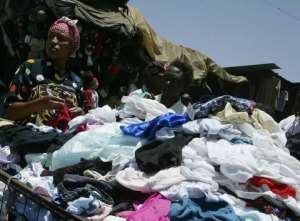
Dear Papa Owusu-Ankomah,
I heard some disturbing news the other day. I am told you are thinking of placing a ban on second hand clothing, with particular emphasis on underwear – popularly known as 'broni wawu pieto'.
I don't think you wear anything second-hand. I have never seen your wife at the 'bend down' boutique so I'm sure she's not into it either. I know your kids will never even be seen dead at a 'broni wawu' joint. So I am quite at a loss as to your sudden desire to clamp down on this all-important, inexpensive item of clothing, without which most of us will be walking around with unsheathed 'langalanga'.
I am told you think second-hand clothing (the underwear in particular) is unhealthy and that they carry all sorts of health risks. Who told you that, my friend? Has anyone complained to you that his (or her) 'koodoso' was caused by second-hand pieto?
I don't think you know a thing about 'broni wawu' so I am taking it upon myself to teach you some bend-down boutique smarts.
First, the fact that it's called second-hand does not always mean that it's been used before. A lot of the time, these are actually 'store-rejects' which will not sell in any shop in Europe or America. Out of his abundant wisdom, the white man knows that what he rejects a black man will gladly accept. This might be a problem for you bourgeois people who think 'broni wawu' is undignified apparel, and therefore, beneath you. But it's not a problem for me and the millions of other Ghanaians who buy and wear them. We just love our 'broni wawu' and we warn you to stay off.
Secondly, every savvy 'broni wawu' buyer knows the “buy first, get fresh” principle. This simply states that if you want to get the best out of the bend down boutique, you have to be there when the bale is cut. This affords you an opportunity to get what we call “the first selection”.
Thirdly, you must also know that people don't wear 'broni wawu' right off the rack. There is what we call “W.I.W.” – wash, iron and wear. This simply means that after making your (first) selection, you go home and get it washed to remove all bacteria and the other disease-causing agents that might have stubbornly clung to the clothing when it was fumigated before shipment. You use as much 'parazone' as necessary – not too much, not too little. Then you hang your selection to dry in the open, preferably when the sun is scorching and there is a gentle, warm breeze. When it is sufficiently dried, you iron it and you are, as the Americans say, “good to go”. It is only after 'WIW' that you can wear your second hand item of clothing, anywhere you want.
I am told that you classify second-hand 'pieto' as “high risk goods” – in the same category as LPG, cosmetics and pharmaceuticals – because they have “serious health and safety implications”, according to a Ghana News Agency report. I don't know the basis of your classification but take this from me: the health risks 'broni wawu' carries are far less than the “noises” you politicians make. The stench and the dirt we see all around pose more of a health risk than 'broni wawu'.
I hope you realise that this 'broni wawu' trade provides a livelihood for hundreds of thousands of people around the country. And you are thinking of banning it because of a false perception of risk? Please, banish the thought. Any attempt to follow through with your threat will be fiercely resisted. I have never gone on a demonstration before but if you dare place a ban on 'broni wawu' you will see me on the streets in the oversized 'pieto' I recently bought at Kantamanto.
Credit: Ato Kwamena Dadzie




 We’ll no longer tolerate your empty, unwarranted attacks – TUC blasts Prof Adei
We’ll no longer tolerate your empty, unwarranted attacks – TUC blasts Prof Adei
 Bawumia donates GHc200,000 to support Madina fire victims
Bawumia donates GHc200,000 to support Madina fire victims
 IMF to disburse US$360million third tranche to Ghana without creditors MoU
IMF to disburse US$360million third tranche to Ghana without creditors MoU
 Truck owner share insights into train collision incident
Truck owner share insights into train collision incident
 Paramount chief of Bassare Traditional Area passes on
Paramount chief of Bassare Traditional Area passes on
 Two teachers in court over alleged illegal possession of BECE papers
Two teachers in court over alleged illegal possession of BECE papers
 Sunyani: Victim allegedly shot by traditional warriors appeals for justice
Sunyani: Victim allegedly shot by traditional warriors appeals for justice
 Mahama vows to scrap teacher licensure exams, review Free SHS policy
Mahama vows to scrap teacher licensure exams, review Free SHS policy
 Government will replace burnt Madina shops with a new three-story, 120-store fac...
Government will replace burnt Madina shops with a new three-story, 120-store fac...
